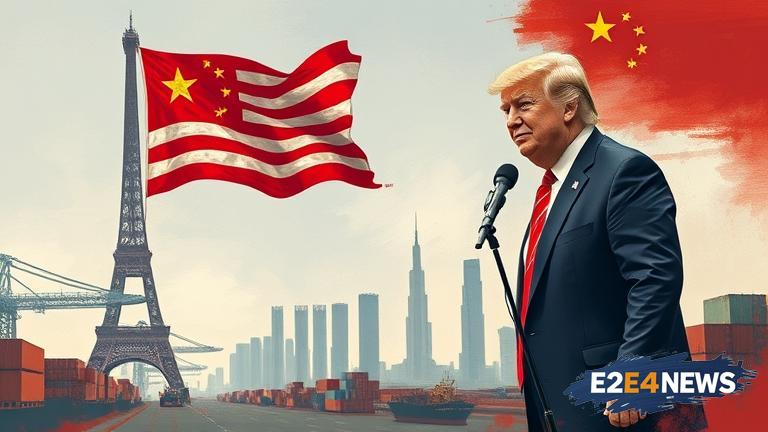In a highly anticipated announcement, President Trump revealed a monumental trade deal, which will impose 15% tariffs on a wide range of Chinese goods. This move is expected to have far-reaching implications for the global economy, as it aims to address the long-standing trade imbalance between the United States and China. The tariffs, set to take effect immediately, will apply to approximately $300 billion worth of Chinese imports, including electronics, clothing, and machinery. The decision has been met with a mix of reactions, with some hailing it as a major victory for American businesses and workers, while others have expressed concerns about potential retaliation from China. The trade deal is the culmination of months of intense negotiations between the two nations, with the US seeking to level the playing field and protect its intellectual property rights. China, on the other hand, has been accused of engaging in unfair trade practices, including theft of American technology and trade secrets. The imposition of tariffs is seen as a key component of the Trump administration’s ‘America First’ policy, which prioritizes the interests of American businesses and workers above all else. The move is also expected to have significant implications for the global supply chain, as companies may be forced to rethink their manufacturing and sourcing strategies. Despite the potential risks, many American businesses have welcomed the move, citing the need to protect their intellectual property rights and prevent unfair competition from Chinese firms. The deal has also been seen as a major coup for the Trump administration, which has faced criticism for its handling of trade policy in the past. However, not everyone is convinced that the tariffs will have the desired effect, with some economists warning that they could lead to higher prices for American consumers and potentially even a recession. The Chinese government has also responded to the announcement, with officials vowing to take ‘necessary countermeasures’ to protect the country’s interests. As the situation continues to unfold, one thing is clear: the imposition of 15% tariffs on Chinese goods marks a significant escalation in the trade war between the US and China. The move is likely to have far-reaching consequences for the global economy, and its impact will be closely watched by businesses, investors, and policymakers around the world. The Trump administration has argued that the tariffs are necessary to protect American businesses and workers, and to prevent China from engaging in unfair trade practices. However, others have warned that the move could lead to a trade war, with potentially devastating consequences for the global economy. The imposition of tariffs is also likely to have significant implications for the US economy, with some predicting that it could lead to higher prices for American consumers and potentially even a recession. Despite these risks, the Trump administration remains committed to its ‘America First’ policy, and is determined to protect the interests of American businesses and workers. The deal has also been seen as a major victory for the US trade representative, Robert Lighthizer, who has been instrumental in negotiating the agreement. The imposition of tariffs is also likely to have significant implications for the global trade landscape, with other countries potentially seeking to renegotiate their trade agreements with the US. As the situation continues to unfold, one thing is clear: the imposition of 15% tariffs on Chinese goods marks a significant escalation in the trade war between the US and China, and its impact will be closely watched by businesses, investors, and policymakers around the world. The move is likely to have far-reaching consequences for the global economy, and its impact will be felt for years to come. The Trump administration’s decision to impose tariffs on Chinese goods is a clear indication of its commitment to protecting American businesses and workers, and to preventing China from engaging in unfair trade practices. However, the move is also likely to have significant implications for the US economy, and its impact will be closely watched by economists and policymakers around the world.
